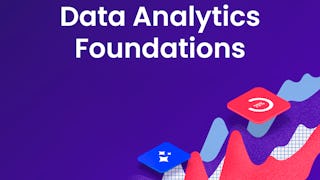This course offers students an opportunity to learn fundamentals of computation required to understand and analyze real world data. The course helps students to work with modern data structures, apply data cleaning and data wrangling operations. The course covers conceptual and practical applications of probability and distribution, cluster analysis, text analysis and time series analysis.



Kompetenzen, die Sie erwerben
- Kategorie: Data Manipulation
- Kategorie: Python Programming
- Kategorie: Computational Thinking
- Kategorie: Data Cleansing
- Kategorie: Data Analysis
- Kategorie: Data Visualization
- Kategorie: Data Structures
- Kategorie: Machine Learning Algorithms
- Kategorie: Algorithms
- Kategorie: Time Series Analysis and Forecasting
- Kategorie: Data Wrangling
- Kategorie: Unsupervised Learning
- Kategorie: Exploratory Data Analysis
Wichtige Details

Zu Ihrem LinkedIn-Profil hinzufügen
Juli 2025
14 Aufgaben
Erfahren Sie, wie Mitarbeiter führender Unternehmen gefragte Kompetenzen erwerben.

In diesem Kurs gibt es 7 Module
In this module, we will focus on Python programming fundamentals. The aim is to help you understand Python's basic syntax, data types, and operators, enabling the creation of simple programs. Additionally, we will cover the use of if statements, loops, and proper indentation to control program flow, fostering a foundational understanding of essential control structures in Python programming.
Das ist alles enthalten
5 Videos6 Lektüren2 Aufgaben1 Diskussionsthema
In this module we will dive into the diverse landscape of Python data structures, including lists, dictionaries, sets, tuples, and arrays. By exploring real-world use cases, you will uncover the unique strengths and weaknesses of each data structure. You will gain insights into recognizing and understanding the characteristics of these structures, empowering you to make informed choices when tackling programming challenges. Through hands-on practice, you will develop the skills to select and apply the most suitable data structure to efficiently solve a wide range of problems, enhancing their proficiency in Python programming.
Das ist alles enthalten
2 Videos2 Lektüren1 Aufgabe
In this module we will introduce DataFrames, a pivotal tool in data manipulation and analysis. You will grasp the fundamental concepts of DataFrames, learning how to create, manipulate, and access data efficiently. You will gain essential skills for basic data exploration–including summarizing data, indexing, and slicing, enabling them to extract meaningful insights. Furthermore, this module equips learners with the expertise to clean and preprocess data, covering handling missing values, filtering data, merging/joining datasets, and transforming data for analysis readiness. By the end of this module, you will harness DataFrames for advanced data analysis, mastering group-wise operations, aggregation, and statistical analysis.
Das ist alles enthalten
3 Videos3 Lektüren2 Aufgaben
This module will equip you with a comprehensive toolkit for proficient data exploration and analysis. It covers the essential techniques and tools for effectively summarizing data sets, encompassing statistical summaries, data visualization, and data cleaning methods. You will learn how to identify and assess missing data, outliers, and anomalies, vital tasks during the initial exploratory phase of data analysis. Furthermore, you will develop the ability to uncover patterns, relationships, and trends within the data using various visualizations, including scatter plots, histograms, and correlation matrices, enabling you to extract valuable insights and make informed decisions from the data.
Das ist alles enthalten
2 Videos2 Lektüren1 Aufgabe
In this module, we will delve into the fundamental concepts of clustering, a critical component of data analysis and pattern recognition. You will learn to recognize the importance of clustering and its role in identifying meaningful groups within data. You will explore key concepts, including data similarity, distance metrics, and the objective of grouping similar data points together. Additionally, the module equips you with the skills to assess the quality of clustering results through evaluation metrics like silhouette score and Dunn index, as well as visual inspection of clustering plots. By the end of this module, you will be proficient in understanding, applying, and evaluating clustering techniques for effective data analysis and pattern recognition.
Das ist alles enthalten
4 Videos4 Lektüren2 Aufgaben
This module will provide you with a comprehensive exploration of clustering algorithms, enabling proficiency in this crucial data analysis technique. You will identify various clustering algorithms, such as k-means, hierarchical clustering, and DBSCAN, along with their underlying principles and assumptions. The expertise you will gain will help you determine the most suitable clustering algorithm based on data characteristics and objectives, and you will learn to implement these algorithms using programming languages like Python and tools such as scikit-learn. The clustering quality can be evaluated using internal and external validation methods, as discussed in Week 5.
Das ist alles enthalten
4 Videos4 Lektüren3 Aufgaben
In this module, you will explore the realm of time series data, gaining a comprehensive understanding of its characteristics, components (trend, seasonality, and noise), and prevalent sources across diverse domains. Through effective visualization techniques and descriptive statistics, you will acquire the skills to recognize patterns and trends within time series data.
Das ist alles enthalten
4 Videos5 Lektüren3 Aufgaben
Erwerben Sie ein Karrierezertifikat.
Fügen Sie dieses Zeugnis Ihrem LinkedIn-Profil, Lebenslauf oder CV hinzu. Teilen Sie sie in Social Media und in Ihrer Leistungsbeurteilung.
Dozent

Mehr von Data Analysis entdecken
 Status: Kostenloser Testzeitraum
Status: Kostenloser TestzeitraumDeepLearning.AI
 Status: Vorschau
Status: VorschauNortheastern University
 Status: Vorschau
Status: VorschauUniversity of Illinois Urbana-Champaign
 Status: Kostenloser Testzeitraum
Status: Kostenloser TestzeitraumUniversity of London
Warum entscheiden sich Menschen für Coursera für ihre Karriere?





Neue Karrieremöglichkeiten mit Coursera Plus
Unbegrenzter Zugang zu 10,000+ Weltklasse-Kursen, praktischen Projekten und berufsqualifizierenden Zertifikatsprogrammen - alles in Ihrem Abonnement enthalten
Bringen Sie Ihre Karriere mit einem Online-Abschluss voran.
Erwerben Sie einen Abschluss von erstklassigen Universitäten – 100 % online
Schließen Sie sich mehr als 3.400 Unternehmen in aller Welt an, die sich für Coursera for Business entschieden haben.
Schulen Sie Ihre Mitarbeiter*innen, um sich in der digitalen Wirtschaft zu behaupten.
Häufig gestellte Fragen
Access to lectures and assignments depends on your type of enrollment. If you take a course in audit mode, you will be able to see most course materials for free. To access graded assignments and to earn a Certificate, you will need to purchase the Certificate experience, during or after your audit. If you don't see the audit option:
The course may not offer an audit option. You can try a Free Trial instead, or apply for Financial Aid.
The course may offer 'Full Course, No Certificate' instead. This option lets you see all course materials, submit required assessments, and get a final grade. This also means that you will not be able to purchase a Certificate experience.
When you purchase a Certificate you get access to all course materials, including graded assignments. Upon completing the course, your electronic Certificate will be added to your Accomplishments page - from there, you can print your Certificate or add it to your LinkedIn profile. If you only want to read and view the course content, you can audit the course for free.
You will be eligible for a full refund until two weeks after your payment date, or (for courses that have just launched) until two weeks after the first session of the course begins, whichever is later. You cannot receive a refund once you’ve earned a Course Certificate, even if you complete the course within the two-week refund period. See our full refund policy.
Weitere Fragen
Finanzielle Unterstützung verfügbar,
 enthalten
enthalten
